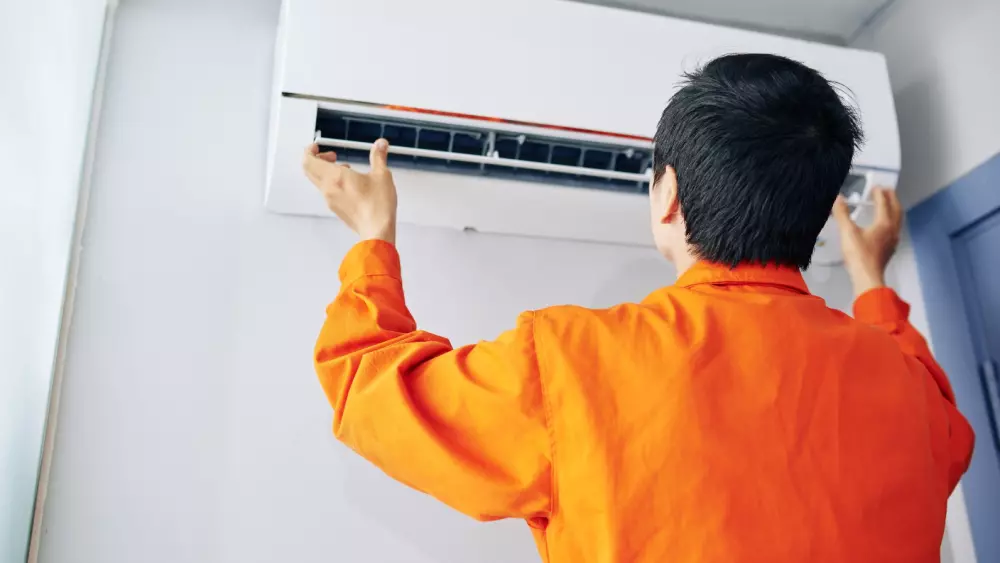In this page you will find information about
What is an AC allergy?
Air conditioning makes me feel ill! This is a statement we hear a lot. The truth is that respiratory problems caused by air conditioning are not an indication that you are allergic to the device! However, it is mostly related to the quality of the air produced by the AC, as it may include one or more toxins to which you are allergic. 2
In other words, AC allergy refers to allergic responses, like coughing, sneezing, congestion, dry skin, and frequent nosebleeds, which are caused by the distribution of airborne allergens and/or too dry air conditioning.2
People who spend their time in air-conditioned buildings experience more respiratory issues than those who do so in buildings with natural airflow. 1
Symptoms of AC allergy
What is the reason behind air conditioning allergy?
Spending a lot of time in air-conditioned environments can cause allergy which is typically caused by either an unhealthy indoor environment where the air conditioner filter will eventually gather so much debris “become dirty” and it will start re-pushing it into your home! or an excessively dry environment (or both!).
How does a dirty air conditioner make you sick?
Why would an air conditioner get dirty? It happens when it pulls in air from the room to cool it, and dirt accumulates in the filter, blocking the airflow. A dirty filter impairs the cooling efficiency and can harbor biological contaminants like viruses, bacteria, etc., putting you and your family at risk of health problems such as allergies, like hypersensitivity pneumonitis, allergic rhinitis and asthma, or diseases like influenza and lung infections.4,10
Here are examples of contaminants to blame for your AC allergy:2
1- Pollen
It originates from plants and can enter rooms through open windows/doors or by clinging to people's shoes/clothing. Although air flow can keep pollen particles suspended for hours, they usually settle on surfaces due to their size.
2- Dust mites
Dust mites are common in homes and buildings and feed on human skin. They can also breed inside your air conditioner.
3- Pet dander
People with allergies may react to proteins in pet dander. The air conditioner can spread pet dander in the air, causing allergy symptoms.
4- Mold
Mold can grow in the air conditioning unit if it provides a moist environment. Wet cooling coils, humidifiers, or condensate pans can create the perfect conditions for mold to thrive and pose a risk of mold growth.
5- Bacteria and viruses
Bacteria and viruses can be brought into a home by people and animals. There are several viruses and bacteria that can spread through the air. They might flow through your air conditioner, making you sick.
6- Volatile organic compounds
They can be found in a variety of goods, including cleaning items for the home. These dangerous gasses can flow inside your air conditioner, especially if they are used as cleaning agents.
The effect of dry environment on AC allergy
People suffering from allergies may be negatively impacted by temperature extremes and dryness. Too much dry air and lack of humidity can exacerbate the issue. This condition is called non-allergic rhinitis and can cause symptoms similar to allergic reactions.9
In addition to that, a lack of humidity in the air can also make your skin dry, scratchy, and even cause frequent nosebleeds. So, during the warmer months, if you have these symptoms, your air conditioner might be to blame.9
Therefore, maintaining the temperature within the median limits is crucial. Moreover, between 40 and 50 percent relative humidity is excellent for both comfort and health; an air conditioner is best equipped to provide this management in order to stop mold formation and its impact on air conditioning allergy sufferers.5

Air conditioning allergy treatment
In order to prevent air conditioner allergic cough and other symptoms, You should Keep your conditioner clean by regularly replacing the air conditioner's filters, clear the area around the outside AC unit of all dust and debris, Keep the doors and windows closed, and purchase good pre- and secondary filters.2,3
The primary treatment for allergy symptoms is oral antihistamines, which disrupt the underlying processes that can cause an allergy symptoms.8
TELFAST 180 mg or 120 mg tablets, for example, are antihistamines that reduce allergy symptoms caused by air conditioning. which is a non-drowsy antihistamine that can help in the fast relief of sneezing, coughing, itchy skin and other allergy symptoms, and its effect lasts for 24 hours. 6
Other options include: 8
 Decongestants.
Decongestants.
 Nasal steroid spray. Such as NASELFAST nasal spray which provide local relief of nasal symptoms.
Nasal steroid spray. Such as NASELFAST nasal spray which provide local relief of nasal symptoms.
 Cough lozenge.
Cough lozenge.
 Humidifier or vaporizer.
Humidifier or vaporizer.
Despite the fact that air conditioners may cause problems, it may be beneficial for allergy in specific cases. One way that can significantly contribute to improving indoor air quality is the use of air conditioners because it can control both the temperature and relative humidity in homes, as well as perhaps removing allergens. 5
1. https://www.webmd.com/a-to-z-guides/ss/slideshow-what-ac-does-to-your-body , last visit 8th December 2022.
2. https://www.healthline.com/health/allergic-to-air-conditioning , last visit 8th December 2022.
3. https://filterbuy.com/resources/can-you-be-allergic-to-air-conditioning/ , last visit 8th December 2022.
4. https://www.tonystephensrefrigeration.com.au/2021/10/18/dirty-air-conditioner-impact-health/ last visit 8th December 2022.
5. https://www.allergystandards.com/news_events/air-conditioners-and-the-indoor-environment/ last visit 8th December 2022.
6. https://telfast.com.au/products/telfast-120mg/ last visit 8th December 2022.
7. https://www.dixonbros.com/summer-cough-from-a-c last visit 8th December 2022
8. https://www.verywellhealth.com/allergy-cough-5204689 last visited 8th December 2022
9. https://wyckoffcomfort.com/2022/05/the-complex-relationship-between-air-conditioners-and-allergies/ last visited 25th January 2023
10. https://www.epa.gov/indoor-air-quality-iaq/biological-pollutants-impact-indoor-air-quality last visited 25th january 2023
Recommended Reading
Get information about allergies and advice on relieving symptoms so you can live your greatness.






